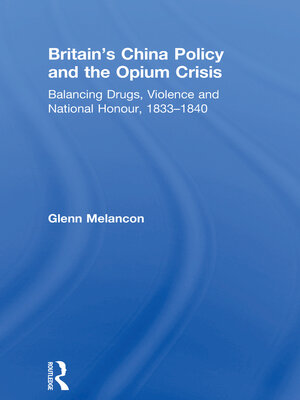Britain's China Policy and the Opium Crisis
ebook ∣ Balancing Drugs, Violence and National Honour, 1833–1840
By Glenn Melancon

Sign up to save your library
With an OverDrive account, you can save your favorite libraries for at-a-glance information about availability. Find out more about OverDrive accounts.
Find this title in Libby, the library reading app by OverDrive.



Search for a digital library with this title
Title found at these libraries:
| Library Name | Distance |
|---|---|
| Loading... |
The first Opium War (1840-42) was a defining moment in Anglo-Chinese relations, and since the 1840s the histories of its origins have tended to have been straightforward narratives, which suggest that the British Cabinet turned to its military to protect opium sales and to force open the China trade. Whilst the monetary aspects of the war cannot be ignored, this book argues that economic interests should not overshadow another important aspect of British foreign policy - honour and shame. The Palmerston's government recognised that failure to act with honour generated public outrage in the form of petitions to parliament and loss of votes, and as a result was at pains to take such considerations into account when making policy. Accordingly, British Cabinet officials worried less about the danger to economic interests than the threat to their honour and the possible loss of power in Parliament. The decision to wage a drug war, however, made the government vulnerable to charges of immorality, creating the need to justify the war by claiming it was acting to protect British national honour.







